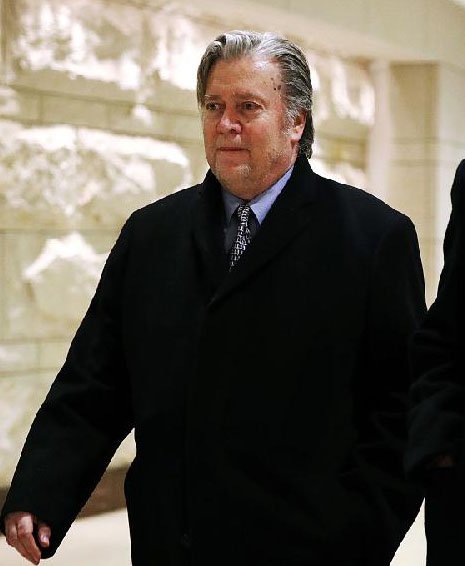WASHINGTON -- President Donald Trump's White House is relying on a sweeping interpretation of executive privilege that is rankling members of Congress on both sides of the aisle as current and former advisers parade to Capitol Hill for questioning about possible connections with Russia.
The White House's contention: Most subjects are off limits until the president says it's not.
The argument was laid bare this week during former White House chief strategist Steve Bannon's interview with the House Intelligence Committee. As lawmakers in the private session probed Bannon's time working for Trump, his attorney got on the phone with the White House counsel's office, relaying questions and asking what Bannon could tell Congress, according to a White House official and a second person familiar with the interview.
The answer was a broad one. Bannon couldn't discuss anything to do with his work on the presidential transition or later in the White House itself.
[PRESIDENT TRUMP: Timeline, appointments, executive orders + guide to actions in first 200 days]
It was also the broadest example yet of the White House using executive privilege to limit a witness's testimony without making a formal invocation of that presidential power.
On Wednesday, White House officials said the phone calls with the counsel's office were standard procedure followed by past administrations in dealings with Congress. They argued that Bannon, like every current and former member of the administration, starts under the assumption that he is covered by executive privilege and can only answer certain questions unless Trump explicitly says otherwise.
But members of Congress, including Republicans, criticized the move. The House panel's top Democrat called it effectively a "gag order." The Intelligence Committee's Republican chairman, Devin Nunes of California, served a subpoena on Bannon in an attempt to compel him to answer.
On Thursday, the committee postponed a planned afternoon interview with Bannon after his lawyer argued that the panel had not given them enough time to coordinate with the administration about what he could discuss.
The panel's deputy staff director told Bannon's attorney, William Burck, on Thursday that the panel "is prepared to extend the return date on the subpoena" it issued for Bannon's testimony during the Tuesday interview, according to emails shared with The Washington Post.
Lawmakers will be closely watching to see how the White House responds to an interview today, when Trump's longtime spokesman Hope Hicks is to appear for a private interview with the committee, according to a person familiar with the panel's work. The person spoke on condition of anonymity because the person wasn't authorized to speak publicly about the matter.
The criticisms echoed those from last summer when Attorney General Jeff Sessions baffled some lawmakers by refusing to answer questions about his conversations with the president, while also maintaining he was not citing executive privilege. After Sessions' testimony before the Senate Intelligence Committee, Democratic Sen. Sheldon Whitehouse said, "As someone who served in the Justice Department, I would love to know what he is talking about."
Traditionally, Congress has required a formal assertion of executive privilege from a witness refusing to answer a question. But recently, "we've seen people just not answer questions without asserting privilege," said Michael Dorf, a Cornell University constitutional law professor.
"It's kind of a game of separation-of-powers chicken that's going on there," he said. "Because nobody knows the full scope of executive privilege -- other than that it's not absolute from the Nixon case -- no one really wants to push it."
Dorf was referring to the court case surrounding the Supreme Court's rejection in 1974 of President Richard Nixon's assertion that he could use executive privilege to prevent the release of tape recordings involving him and other aides.
Burck spoke with Uttam Dhillon, deputy White House counsel. Burck is also representing top White House lawyer Don McGahn in special counsel Robert Mueller's investigation into contacts between the Trump campaign and Russia. In that probe, Bannon will meet with Mueller's investigators for an interview, according to a person familiar with that issue.
In a separate development in the Russia investigations, the FBI was reported to be investigating whether a top Russian banker with ties to the Kremlin illegally funneled money to the National Rifle Association to help Trump win the presidency.
FBI counterintelligence investigators have focused on the activities of Alexander Torshin, the deputy governor of Russia's central bank who is known for his close relationships with both Russian President Vladimir Putin and the NRA, two sources familiar with the matter told McClatchy. It is illegal to use foreign money to influence federal elections.
It was unclear how long the Torshin inquiry has been ongoing.
The sources speaking on condition of anonymity did so because they were not authorized to speak publicly.
Information for this article was contributed by Tom LoBianc, Zeke Miller, Chad Day, Jonathan Lemire, Eric Tucker and Mary Clare Jalonick of The Associated Press and by Karoun Demirjian and Rosalind S. Helderman of The Washington Post; and by Peter Stone and Greg Gordon of the Tribune News Service.
A Section on 01/19/2018
